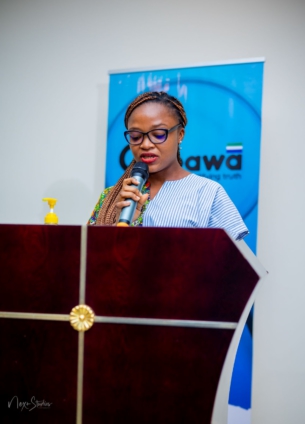Media and research professional Caroline Anipah, has contributed to the critical discourse on the growing issues of misinformation and disinformation, offering valuable insights and strategies to combat these challenges.
Drawing from her extensive experience in research and media, Mrs. Anipah joined Joy News’ AM Show via Zoom to shed light on the complex dynamics of false information. She carefully distinguished between misinformation and disinformation, underlining their unique characteristics and implications.
According to Mrs. Anipah, “Misinformation refers to information that is false but shared without the intention to cause harm.” In contrast, she defined disinformation as “false information deliberately created with the intention to cause harm, shape public opinion, and influence people’s behaviours.”
Highlighting the deliberate nature of disinformation, she remarked, “A lot of emphasis is put into creating disinformation, so it’s not always a mistake by someone. Across the world, disinformation tends to influence behaviours and impacts people’s democracy.”
Mrs. Anipah urged Ghanaians to be vigilant about emerging trends, particularly during sensitive periods such as elections. She noted that the proliferation of disinformation often leaves people unsure of how to interpret or handle the vast amount of information they encounter.
“We’ve noticed that people are increasingly uncertain about how to consume information because they believe there is disinformation everywhere. As a result, they stop tracking the sources of what they read. For instance, as we approach an election, people are confused about what they are hearing,” she said, referencing a recent case involving Wontumi FM to illustrate her point.
Mrs. Anipah emphasised that disinformation is a significant issue in Ghana that requires urgent attention. “I am glad that we are beginning to focus on this, and it’s encouraging to see a collective effort to address the problem,” she stated.
According to UNESCO’s LASP survey, 87% of respondents in a global survey expressed concerns that disinformation could influence elections in their countries with 47% being "very concerned."
Latest Stories
-
Coca-Cola will roll out cane sugar Coke in US after Trump push
12 minutes -
Tourism Ministry inaugurates advisory board
21 minutes -
Wife of Diogo Jota posts ‘forever’ tribute
36 minutes -
Abuakwa South MP urges GNAT to lead Ghana’s EdTech revolution with a digital drive
39 minutes -
Ghana’s actual public debt overstated by GH¢138bn – Auditor General
53 minutes -
Abuakwa South MP demands pact to future-proof Ghana’s education
1 hour -
Leadership is quiet preparation, serve with integrity – Chief of Staff urges youth
2 hours -
Mother confesses to drowning 4-year-old son in well to please lover
2 hours -
Patricia Appiagyei rejects replacing Afenyo-Markin on ECOWAS Parliament delegation
2 hours -
Kevin Taylor’s court appearance without arrest proof of judicial abuse under NDC – NPP MP
2 hours -
The inconvenient truth: Why Africa’s boardrooms must reset the boardroom governance clock
3 hours -
Abuakwa South MP issues appeal for 21st-century overhaul of education system
3 hours -
PURC reports consumer grievances and monitoring efforts in Northern Region
3 hours -
Barcelona B extend Abdul Aziz Issah’s loan for 2025/2026 Season
4 hours -
Black Sabbath singer Ozzy Osbourne dies at 76, Sky News reports
4 hours

